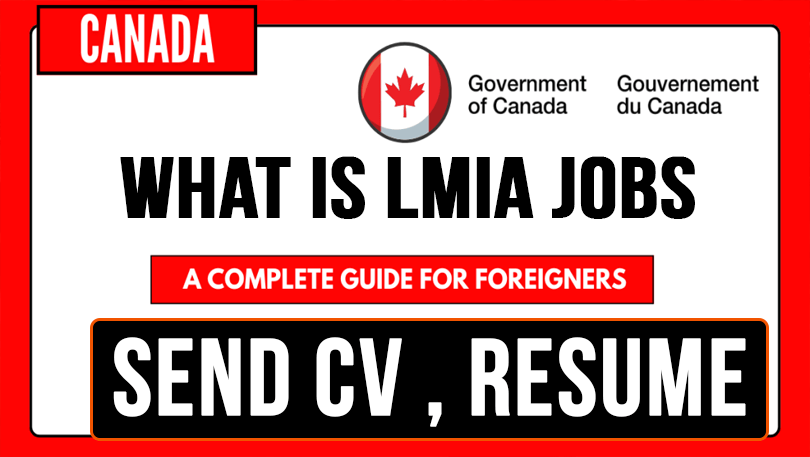What is LMIA Jobs in Canada
What is LMIA Jobs in Canada: “Labour Market Impact Assessment” is the abbreviation. It is a permit that the Canadian government issues to firms who want to bring in foreign labor. The LMIA procedure is intended to verify that hiring foreign labor won’t have a detrimental effect on Canadian workers and the country’s economy.
Most international workers who wish to work in Canada must submit an LMIA. This comprises both permanent residents who are sponsored by their employers and temporary foreign workers who enter Canada through the Temporary Foreign Worker Program (TFWP).
An LMIA job is one that necessitates the issuance of an LMIA prior to the hiring of a foreign worker. Employers must prove during the LMIA process that they made an effort to fill the position with a Canadian citizen or permanent resident but were unsuccessful in doing so.
Many different businesses, including healthcare, engineering, technology, hospitality, and more, provide LMIA positions. If you are a foreign worker interested in working in Canada, you must determine whether the position requires an LMIA as well as whether you are qualified to submit an application for a work permit.
Table of Contents
ToggleWhat is LMIA Jobs in Canada Short Definition and description

When no qualified Canadians or permanent residents are available to fill the post, the LMIA procedure is a crucial step in guaranteeing that Canadian firms can hire foreign labor. According to the procedure, the company must prove that they have taken reasonable steps to hire Canadians, such as posting the job here, and that hiring a foreign worker won’t have a detrimental effect on Canadian workers or the country’s economy.
In Canada, there are two different kinds of LMIA positions: high-paying positions and low-paying positions. Low-paid roles are those that pay less than the regional median wage for the occupation in question. High-wage positions are those that pay above the regional median wage. Compared to the LMIA procedure for low-wage positions, which can occasionally be more complicated, the LMIA process for high-wage positions is typically quicker and simpler.
There are several steps in the LMIA process, including:
- Application for an LMIA is made by the employer to Employment and Social Development Canada (ESDC).
- Once the employer has complied with the standards for awarding an LMIA, ESDC evaluates the application and makes a determination.
- The company gives the foreign worker a copy of the LMIA if it is accepted, at which point they can apply to Immigration, Refugees and Citizenship Canada for a work permit (IRCC).
- The foreign worker may enter Canada and start working for the employer there for the duration of the work permit if the work permit is authorized.
- It is significant to remember that not every employment in Canada calls for an LMIA. There may be some occupations that are exempt from the LMIA requirement, such as those protected by international trade agreements or those in specific professions.
In conclusion, LMIA jobs in Canada are positions that demand the issuance of an LMIA prior to the hiring of a foreign worker. The LMIA procedure is intended to make sure that hiring foreign workers won’t have a detrimental effect on Canadian workers or the country’s economy. If you are a foreign worker interested in working in Canada, it is crucial to find out if the position requires an LMIA and if you are qualified to submit an application for a work visa.
How to Apply Canada Farm Worker with LMIA
Here are some LMIA Jobs Details Below:
For those looking for LMIA Employment and foreign immigrants, Canada is one of the top destinations. Opportunities to live, work, study, travel, and enjoy vacations in stunning settings are provided by this lovely country. All citizens, immigrants, and foreign skilled workers are eligible for a number of welfare, educational, and healthcare programs that are provided by the Canadian federal government. Canada is therefore a sought-after location for young professionals, educated children, international graduates, and highly skilled workers.
Obtaining a job that has been approved by the Labour Market Impact Assessment (LMIA) or LMIA Jobs is one of the safest ways to immigrate to Canada. It is sometimes referred to as an LMIA work permit because it ensures that qualifying applicants will have employment opportunities in Canada for a predetermined period of time. Qualified candidates can take advantage of the LMIA job vacancies in Canada to work for a Canadian business in a certain province or territory.
LMIA approved jobs for foreigners
| Employer Name: | Canada Job Bank |
| Position: | Various Position Opening |
| No. of vacancies: | 357800 |
| Salary: | $75240.00-$178400.00 Annual Income |
| Employment type: | Permanent employment, Full time |
| Street Address | Canada |
1. A driver of a commercial truck
Average salary range: $45,825 to $77,903.
The nation’s transportation infrastructure is crucial to many of Canada’s key industries, including those in the agricultural, oil and gas, mining and metals, forestry, and petrochemical industries. It should come as no surprise that truck drivers are one of Canada’s most in-demand LMIA positions today and will remain so for some years to come given the industry’s phenomenal rate of growth.
In almost every province in Canada, there are specific immigration pathways for experienced truck drivers with work history in Canada. Several areas even provide trustworthy immigration pathways specifically for truck drivers with prior Canadian work experience. In normally, you need an LMIA to get a work permit for a truck driver job; however, at the present, the government has enabled Canadian firms to hire employees without an LMIA to relieve the pressure on the economy for LMIA Employment due to a serious scarcity of workers in certain essential industries.
Foreign workers must self-isolate for at least two weeks prior to starting work, although they will be compensated with $1,500 to help them get by until they receive their first payment.
2. Farm Supervisor
Average salary range: $35,939 to $49,286.
As was already mentioned, Canada’s agricultural sector is one of its most lucrative ones, and the nation is constantly in need of knowledgeable farm laborers and farm managers. It is notably profitable in Canada’s agricultural industry, which also encompasses grain, horticulture, and aquaculture production in addition to animal and grain production. More than 2.3 million people in Canada are employed in the manufacturing sector, and need for skilled laborers is constantly growing. One of the reasons there are so many immigration and workstream programs in the United States specifically for qualified agricultural workers seeking LMIA Jobs is because of this.
You can apply for permanent residence in Canada without obtaining a Canadian work visa through the Agri-Food Pilot Program, the Rural and Northern Immigration Pilot Program, the Atlantic Immigration Pilot, and other PNP programs. But you must apply for a work visa if your employment is only temporary.
3. An individual who gives care
Average salary range: $31,955 to $58,000.
As Canada’s population ages and the birth rate declines, more and more jobs as caregivers open up for foreign workers to fill. The new Caregiver programs allow both home support and childcare professionals to live and work in Canada regardless of prior work experience if they meet the necessary educational and language requirements and have a genuine employment offer in Canada for LMIA Jobs.
After accumulating 24 months of work experience in Canada, you will be qualified to submit an application for permanent residency.
4. Engineers and software developers
Average salary range: $75,596 to $102,000.
Canada, which is considered as one of the world leaders in the field of technological innovation, will always have a strong demand for jobs in the technology sector. A little under one million people were employed in the technology sector in Canada, and cities like Toronto, Vancouver, Montreal, and Ottawa were among the top 20 places in the world for cultivating digital talent in North America. The most sought-after skills in the technology labor market are artificial intelligence (AI), cybersecurity, and, of course, software development, which is why your work is so crucial for LMIA Jobs in Canada.
The best provinces to think about relocating to if you want to live and work in Canada as a software developer are British Columbia and Alberta. Software engineers are a sought-after profession according to both provinces’ provincial nominee programs. You may even apply through British Columbia’s own tech pilot program, with application processing taking as little as two to three months! You should expect a response to your application made through the Alberta INP in as little as six months.
5. Construction Industry Project Managers
Average salary range: $92,240 to $142,000.
In particular, provinces like Alberta, Manitoba, Ontario, and Saskatchewan, which have some of the most important development projects scheduled for the foreseeable future for LMIA Jobs, have identified construction managers as being in high demand under their Provincial Nomination Programs (PNPs). Canada has a large number of construction jobs.
According to statistica.com, the residential sector is where most new developments are concentrated (almost one-third of all new construction). By the end of 2023, Canada will be ready to house the 1.23 million people invited to apply for permanent residency.
6. Oil and gas industry drillers
Average salary: between $67,394 and $103,594.
There are numerous natural resources in Canada. More than 1.7 million people, including Canadian citizens, permanent residents, and highly skilled foreign workers, have found work in the mining sector over the past ten years. Canada, which has the fourth-largest proven oil reserve in the world for LMIA Employment, exports energy resources to 148 countries globally.
In Ontario and British Columbia, there is a considerable demand for oil and gas drillers. You won’t need a work permit if you submit an application through one of the provincial nomination programs, such as the BC PNP or the OINP, as you will be given permanent residency if you receive a provincial nomination, which is worth 600 points toward permanent residency in each province.
7. Certified vocational nurses
Average salary: between $80,126 and $94,322.
Notwithstanding the enormous strain the medical sector has been under recently, Canada has long had a dire need for qualified healthcare professionals. General practitioners and registered nurses make up The LMIA Jobs Canada, with registered nurses holding some of the most in-demand jobs in the nation.
You will have the option of working for the government or a private healthcare organization, both of which offer their employees first-rate benefits. For instance, those employed by the Canadian Medicare system through LMIA Jobs can anticipate receiving 15 days of annual leave after the first year of employment (1,950 hours), with the number of days increasing as more years are worked.
In addition, you will be eligible for 15 days of paid sick time and 15 days of paid parental or maternity leave, which will pay you 93 percent of your weekly salary. You will be qualified for a public sector health care plan in addition to other fantastic benefits. Bonus: If you attended a DLI in Canada and have a Canadian student loan, you may be qualified to have your debt erased for up to $20,000 over the course of five years.
8. Website designers and developers
Average salary: between $80,126 and $94,322.
In addition to being in demand, there will likely be an even greater need for web designers in the future as more and more online platforms are predicted to appear. Canada has established many channels for experienced technology professionals to obtain employment there since it recognizes the need for them. Specialized professions and highly skilled individuals can obtain their work visas for LMIA Jobs in as little as two weeks thanks to avenues like the Global Talent stream.
Both the Fast Entry system, which is becoming more and more popular, and the BC Tech Pilot program are accessible for immigration.
9. Electrician
Average salary range: $66,300 to $84,088.
The construction sector will require a range of workers, including managers and supervisors as well as electricians. Six Canadian provinces are now experiencing an electrician shortage. Alberta, Ontario, Manitoba, New Brunswick, the Northwest Territories, and Yukon are among these provinces. If you fit the qualifications for permanent residence in Canada for LMIA Employment, programs like the Federal Trades Program, which is run by Express Entry, numerous Provincial Nominee Programs, and the Atlantic Immigration Pilot may also be accessible to you.
If you enjoy living near the shore and in a small town, the Atlantic Immigration Pilot may be a great chance for you. You can proceed with the immigration process more swiftly because an employer does not require an LMIA.
10. Engineer, Civil
Average salary range: $66,843 to $102,000.
Another area where there is a severe shortage in Canada is civil engineering. As a Canadian permanent resident, it is feasible to make a very competitive wage and have even greater work perks. Nevertheless, you will also be able to benefit from the high level of living that Canadians enjoy, including free healthcare and education for your kids in addition to other advantages.
What kinds of employment are under the LMIA’s purview?
Employment at LMIA. consist of the following:
This group includes engineers, technical experts, performance artists, artists in the creative and performing arts, and other independent contractors. Only those employees who have been moved within a company (intra-company transferees with specialized expertise) will be helpful to Canada.
How much will LMIA cost you?
A huge rise from the previous $275 per worker payment for LMOs, the application fee for LMIA requests has raised from $275 to $1000 per worker. With the new LMIA system, categorizing and classifying employment is simplified. Jobs will therefore be divided into simply two groups: those with high salaries and those with low salaries for LMIA Jobs.
Can I get PR even though I have LMIA?
Even after receiving a good LMIA for a prearranged employment offer, a person is not automatically qualified to immigrate to Canada. Before being allowed to the nation, skilled foreign workers must meet all requirements for becoming permanent residents under the Fast Entry immigration process.
Requirements
- The candidate should speak English with ease.
- Standard educational qualifications like a bachelor’s degree, a certificate, or a certification are not necessary.
- There is no requirement for prior agricultural industry experience.
Conclusion
Hopefully, you now have a better understanding of the numerous LMIA Careers. Start your job applications before it’s too late because the world is moving quickly and you shouldn’t fall behind.
You May Like Below Jobs:
Agriculture Fruits Farm Worker Jobs in Canada with LMIA




I’m extremely inspired with your writing abilities as neatly as with the layout to your blog. Is this a paid topic or did you customize it your self? Either way keep up the excellent quality writing, it is rare to peer a great weblog like this one nowadays!